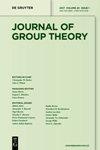线性群中的霍尔类
IF 0.5
3区 数学
Q4 MATHEMATICS
引用次数: 0
摘要
Philip Hall的一个著名定理指出,如果一个群𝐺有一个幂零的正子群倘使G/N′G/N^{\素数}是幂零的,则𝐺本身也是幂零的。我们说一个群类𝔛是一个霍尔类,如果它包含所有群𝐺承认一个幂零的正则子群(即G/N ' G/N^{\素数}属于𝔛)。[F]中已经给出了例子。de Giovanni, M. Trombetti和B. a . F. Wehfritz,群的霍尔类,以显示:对于霍尔类的许多自然选择𝔛,有限的-𝔛群不能形成霍尔类。虽然这些例子通常是线性的,但我们在这里的目的是证明在线性群的某些自然子类中情况要好得多。本文章由计算机程序翻译,如有差异,请以英文原文为准。
Hall classes in linear groups
Abstract A well-known theorem of Philip Hall states that if a group 𝐺 has a nilpotent normal subgroup 𝑁 such that G / N ′ G/N^{\prime} is nilpotent, then 𝐺 itself is nilpotent. We say that a group class 𝔛 is a Hall class if it contains every group 𝐺 admitting a nilpotent normal subgroup 𝑁 such that G / N ′ G/N^{\prime} belongs to 𝔛. Examples have been given in [F. de Giovanni, M. Trombetti and B. A. F. Wehfritz, Hall classes of groups, to appear] to show that finite-by-𝔛 groups do not form a Hall class for many natural choices of the Hall class 𝔛. Although these examples are often linear, our aim here is to prove that the situation is much better within certain natural subclasses of the universe of linear groups.
求助全文
通过发布文献求助,成功后即可免费获取论文全文。
去求助
来源期刊

Journal of Group Theory
数学-数学
CiteScore
1.00
自引率
0.00%
发文量
45
审稿时长
6 months
期刊介绍:
The Journal of Group Theory is devoted to the publication of original research articles in all aspects of group theory. Articles concerning applications of group theory and articles from research areas which have a significant impact on group theory will also be considered.
Topics:
Group Theory-
Representation Theory of Groups-
Computational Aspects of Group Theory-
Combinatorics and Graph Theory-
Algebra and Number Theory
 求助内容:
求助内容: 应助结果提醒方式:
应助结果提醒方式:


